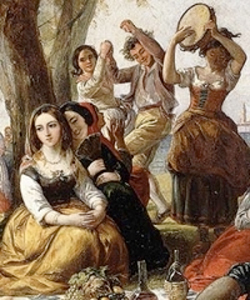by Nicholas Jones

Soprano Amanda Powell gave passionate renditions of three songs from the Jewish and Arab quarters, demonstrating her background in jazz by bending notes and inflecting motifs with expressive phrasing and nuanced improvisations. She was accompanied by an ensemble of haunting soundscapes: harp, flute, and shawm (Luke Conklin), hammered dulcimer (Tina Bergmann), and a host of atmospheric percussion sounds, including the goblet drum.
The palaces of Venice, as Sorrell pointed out, held frequent musical entertainments featuring the music of such notables as Claudio Monteverdi and Salamone Rossi (himself a Jew, and much in favor in elite circles). Selections from Rossi’s instrumental music — a sinfonia, a balletto, a bergamasco, and a galliard — were high-energy, eminently upbeat pieces imbued with an unabashed frivolity, and played with the usual Apollo’s Fire sparkle.
Monteverdi joined the party with the lovely wedding scene from the beginning of Orfeo, aswirl with romantic imagery and uplifting music. The part of Orfeo, the great singer and happy bridegroom — for the moment at least — was delivered with energy, confidence, and admirable diction by tenor Owen McIntosh, despite occasionally pushing his voice more than needed. Euridice was sung by the clear-voiced, accomplished soprano Erica Schuller.
The selection from Orfeo segued seamlessly into a lovely ballad by the slightly later composer Tarquinio Merula, gently accompanied by a flute in the low registers. Monteverdi’s Scherzi musicali (musical jokes) completed the party, sung with flirtatious élan by Powell, McIntosh, and Schuller in various combinations, and with considerable theatrical flair. While the ensemble suffered a bit from the dramatics (there was a good deal of play with roses), it was evident that you’d be lucky to be invited to this party.
No Venetian evening would be complete without a visit to the orphanage of the Pietà to hear the pupils of the priest-turned-impresario, Antonio Vivaldi, playing their virtuosic concerti. Concertmaster Olivier Brault opened the program with “Autumn” from the Four Seasons, with plenty of harvest-home merriment and a galloping hunt across the fall countryside. Flexibility of tempo went just a little too far at times, and Brault’s otherwise fine playing was marred by some distracting stage gestures.
Later in the program, flutist Kathie Stewart played a lesser-known Vivaldi concerto, La Notte (“Night”). Here we seemed to walk beside the dark canals, haunted by strange fantasms and agitated dreams. Stewart’s expressive flute work was too often inaudible from where I sat, given the largish string band accompanying her. The final Vivaldi work, his A minor concerto for two violins — a sunny work despite its minor key — was played with energy and finesse by Johanna Novom and Adriane Post.
Two lovely selections brought the program to a contemplative close. Monteverdi’s duet “Pur ti miro” from L’Incoronazione di Poppea takes simple elements — a four-note descending scale in the bass line and another four-note motif with a simple rise and fall in the treble — weaving them into a texture of profound and tender affection. It’s a piece of quiet musical magic, especially when you consider that the characters in the duet are the notorious emperor Nero and his mistress Poppea, celebrating their triumphant ascendancy after murdering just about everyone else. The unusual use of the hammered dulcimer provided a wonderful shimmer above Michael Leopold’s excellent theorbo playing.
The final piece was not Venetian but seemed quite appropriate to the theme of the concert. Figli di Dio (“Children of God”) was commissioned by Apollo’s Fire from its versatile cellist René Schiffer, on an Italian text by Sorrell. In neo-Baroque style, it begins with a chaconne on the question “Why do I fear?” and proceeds not so much to answer that question as to transcend it in a gesture of universal humanity. The admirably disciplined Apollo’s Musettes, directed by Margaret Carpenter Haigh, charmingly urged all of us to sing together across divisions of gender and race, for we are all “children of God.”
Published on ClevelandClassical.com November 22, 2016.
Click here for a printable copy of this article


